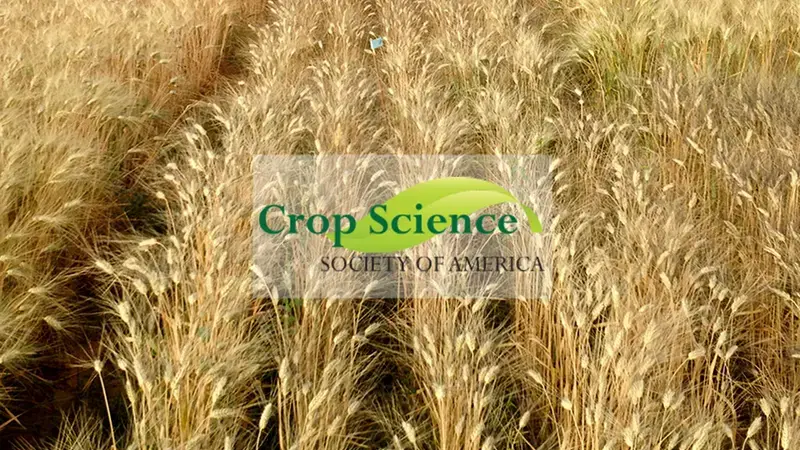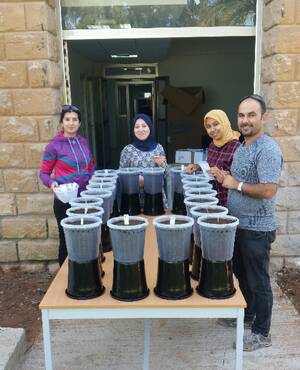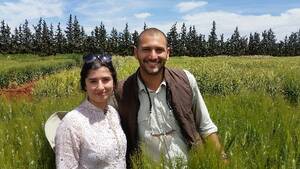ICARDA scientists win the Crop Science Society of America 2020 Outstanding Paper Award

This scientific study was funded by the Australian Grains Research and Development Corporation (GRDC) and CGIAR's Research Program on Wheat (WHEAT).
ICARDA is thrilled to announce that the 2020 Outstanding Paper Award of Crop Science Journal by the Crop Science Society of America (CSSA) went to the paper titled "Root System Architecture and Its Association with Yield under Different Water Regimes in Durum Wheat". It explores the genetic variability for mature root traits among 25 durum genotypes by adapting low‐cost phenotyping methods and determining the effect of different root types on yield under moisture stress.
The CSSA is a bimonthly peer-reviewed scientific journal, recognized as one of the premier showcases of agricultural scientific research. After careful consideration by a subset of the Crop Science Editorial Board and other member-scientists, the article was selected based on how it has advanced knowledge in the profession, the effectiveness of communication, methodology, originality, and impact
Durum wheat is a vital crop for food security and to generate income in many dryland areas around the world, especially in the Mediterranean Basin; however, droughts often hinder its production. Roots play an essential role in reaching into the ground and absorbing rainwater. This study helps ICARDA and its partners to develop durum wheat varieties capable of withstanding drought stress. This is a significant constraint for farmers worldwide, and it will become even more challenging as climate change continues to reduce moisture availability during the season.
The study was led by Dr Khaoula El Hassouni, former PhD student of ICARDA and Universite Mohammed V, via a collaboration with Prof Hickey and Dr Alhamad of Queensland Alliance for Agriculture and Food Innovation (QAAFI) . It revealed that different varieties produce different types of roots: some concentrate on the top layers of the soil via a "wide" root angle, while others explore the deeper layers via a "narrow" root angle. This difference is critical for drought adaptation since in shallow rocky soils like in the Atlas Mountains of Morocco or the Beqaa Valley in Lebanon "wide" root angle can capture moisture before it evaporates. Instead, in deeper soils, the "narrow" angle allows roots to reach the rainwater that has percolated to the bottom and use it to increase productivity. Assessing the impact on field performances of different root types showed that up to 38% higher yield could be achieved by "narrow" angled roots in deep soil with terminal drought stress. At the same time, this resulted in a disadvantage if irrigation water was available. Hence, targeted breeding for specific root system architecture should ultimately result in more resilient durum wheat cultivars under water‐limited environments.
Several wheat studies have evaluated roots using different phenotyping methods with different degrees of success. In this study, the researchers used two simple and inexpensive methods defined as "clear pot" for seminal root angle and "pasta strainer" (basket) for mature root assessment, using two different water regimes. The ability of these methods to ultimately predict field performances confirmed their value and affordability.
This study was funded by the Australian Grains Research and Development Corporation (GRDC) and CGIAR Research Program on Wheat (WHEAT) led by CIMMYT. We extend our thanks to the American Society of Agronomy (ASA) and the Crop Science journal team for their role in promoting scientific research, and to the Associated Editor Dr Steve Larson and three anonymous reviewers for their help in achieving the current form of the article. The American Society of Agronomy has presented Outstanding Paper Awards since 2018. The CSSA award is for articles published in the prestigious Crop Science journal. This year, the awardees will be recognized during a virtual annual meeting and again at the 2021 Annual Meeting in Salt Lake City, Utah, United States of America.

breeding resilient varieties of Durum Wheat
The Outstanding Paper authors:
- K. El Hassouni of the International Center of Agricultural Research in the Dry Areas (ICARDA),
- S. Alahmad of The University of Queensland,
- B. Belkadi of The University of Mohammed V,
- A. Filali-Maltouf of The University of Mohammed V,
- L. T. Hickey of The University of Queensland, and
- F. M. Bassi of the International Center of Agricultural Research in the Dry Areas (ICARDA).
Relevant Links:
https://www.agronomy.org/publications/awards/
https://twitter.com/crop_science
https://twitter.com/K__ELHassouni
https://twitter.com/fillobax/status/1317020482206683136
https://www.crops.org/news/science-news/wild-cousins-may-help-crops-bat…;


